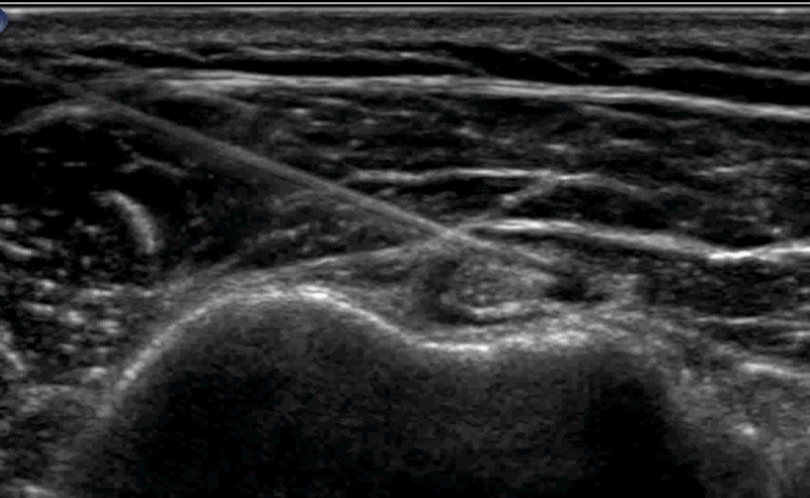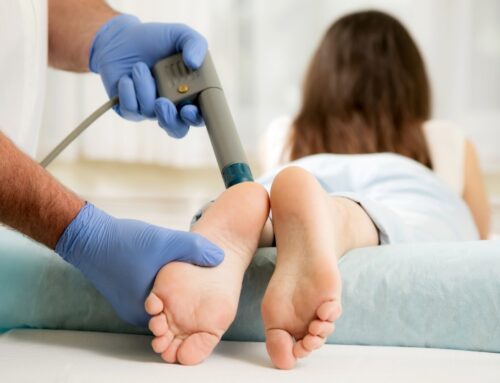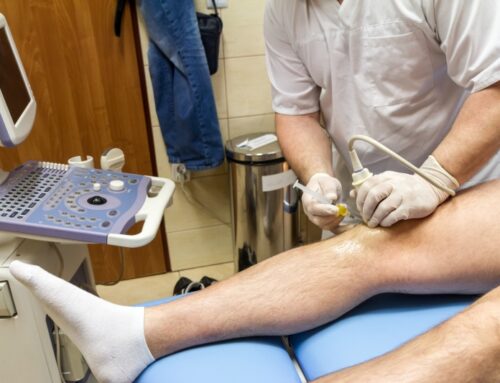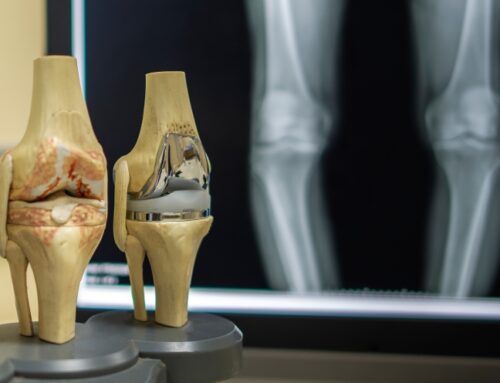We use injections in sports medicine to reduce pain. Drugs injected include cortisone, hyaluronic acid, and platelet-rich plasma (PRP). In most cases, we perform these injections without direct vision. Instead, we direct the needle based on our knowledge of the position of bone, tendons, and joints. However, delivering an injection into a tendon or joint is not as easy as it sounds. For example, for tendons, we need to inject them into the tendon sheath. Moreover, joint injections must be administered into the joint rather than the surrounding soft tissue. Recently, doctors have been using techniques to direct the needle to the right spot. For example, ultrasound guided injection allows us to see the needle directed to the target. Why use ultrasound to guide these procedures, and where can you get an ultrasound guided injection in London?
What are our options for guidance: X-ray or ultrasound guided injection?
Generally, we perform guided injections with either ultrasound or X-ray. Ultrasound-guided injections have many advantages compared to X-rays, such as being cheaper and using no radiation. Previously, doctors used ultrasound infrequently due to the cost. Now, ultrasounds are portable and more affordable, meaning doctors can perform ultrasound-guided injections in their office rooms rather than in a hospital, saving time and money.
How do we perform an ultrasound guided injection?
Generally, doctors perform ultrasound injections like traditional injections. Firstly, we place sterile gel onto the skin. Then, we use the ultrasound probe to visualise the target. Finally, we direct the needle tip to the target site using an ultrasound picture. For example, the video below shows a needle carefully directed to the shoulder bursa above the rotator cuff tendons. This injection is often used for rotator cuff tendonitis.
Is an ultrasound guided injection better?
Studies say that Ultrasound injections are more accurate for most joint and soft tissue problems. For example, we perform ultrasound-guided knee joint injections with 100% accuracy compared to standard injections with only 75%. In addition, there is evidence that using ultrasound improves pain relief. For example, ultrasound in carpal tunnel syndrome, rotator cuff tendonitis, and knee joint arthritis leads to more significant pain relief. Finally, there is evidence that ultrasound injections are less expensive for knee and hip joint injections. This makes sense as more substantial pain reduction will mean that patients see their doctor less.
A recent study confirms the better effect of ultrasound guidance. In a study with over 1000 patients who had hyaluronic acid injections for knee arthritis, those patients who had injections with ultrasound had much fewer rates of knee replacement (over 30% less) than those who had blind injections.
Moreover, as using ultrasound is more accurate, there are other advantages, such as reduced side effects and more reliable information on the correct source of pain.
Fluoroscopy vs. ultrasound: which is better?
Most studies suggest that fluoroscopy vs. ultrasound injection is the same regarding accuracy and effectiveness. However, we know that ultrasound is much cheaper. Also, most people prefer ultrasound to fluoroscopy. The primary reason for this preference is that we do an ultrasound in a clean office space, which takes less time. On the other hand, doctors do fluoroscopy in an operating theatre, taking many hours. Moreover, fluoroscopy involves using radiation, while ultrasound is radiation-free.
Can anyone perform an ultrasound guided injection?
It takes many years to learn how to do an ultrasound injection like any skill.
Doctors, physiotherapists, and podiatrists perform musculoskeletal ultrasound-guided injections in London and UK. Overall, skill level can vary, affecting the success of an injection. You must have an injection performed by a practitioner who has excellent skills. Doctors generally have more ultrasound and ultrasound-guided injection training than other practitioners. You should ask your practitioner about experience and training.
While cost is an important factor, always be wary of non-doctor practitioners who charge less for injections. Some non-doctor practitioners in the UK perform ultrasound guided injections in an unregulated environment. Conversely, doctors are tightly regulated by the government body called the CQC or Care Quality Commission and General Medical Council. Both of these bodies strive for safe and effective health delivery services.
How do you know whether your practitioner is a specialist doctor?
Check to see whether your practitioner is registered with the General Medical Council. Ideally, the doctor should be part of the specialist register, although some general practitioners also have training in ultrasound and ultrasound-guided injections.

Other frequently asked questions about an ultrasound-guided injection
Are ultrasound guided injections painful?
Yes. However, research suggests that performing injections with ultrasound makes them less painful than without. We think this is because using ultrasound means the doctor is more accurate and is less likely to hit other structures, such as nerves and blood vessels.
How long does an ultrasound guided injection take?
Generally, ultrasound means the injection takes a little longer than blind injections. However, this extra time is worth it due to improved accuracy and effectiveness.
Does using ultrasound mean that the infection risk increases?
Using ultrasound for an injection makes the injection more complex. But it doesn’t necessarily mean the risks are increased. However, you should ensure your doctor takes the necessary steps to safeguard against infection. These are the top four questions to ask if you consider an ultrasound-guided injection.
Select the area on the body below and explore injection options for your pathology.

SHOULDER INJECTIONS
ELBOW INJECTIONS
WRIST AND FINGER INJECTIONS
HIP AND GROIN INJECTIONS
KNEE INJECTIONS
FOOT AND ANKLE INJECTIONS
- Ankle arthritis
- Arthrofibrosis ankle
- Tibialis posterior tendonitis
- Mid-foot arthritis
- Sub-talar joint arthritis
- Insertional Achilles tendonitis
- Mid-portion Achilles tendonitis
- Baxter's nerve entrapment
- Plantar fasciitis
- Morton's neuroma
- Big toe arthritis
- Ankle sprain
- Posterior ankle impingement
- Arthrofibrosis ankle joint
- Tarsal coalition
- Os peroneum
- Accessory navicular syndrome
- Sinus tarsi
Final word from Sportdoctorlondon about guided injection
In summary, ultrasound is accurate and effective for joint and tendon injections. Also, ultrasound reduces side effects. Most importantly, you should ask about the skill level of your practitioner. Doctors generally have excellent training and skill levels in performing ultrasound-guided injections. They are also regulated by the government body – CQC and GMC- while other practitioners are not.
Dr. Masci performs ultrasound guided injections in London. He has over 15 years of experience using ultrasound to guide injections and teaches other doctors how to inject under ultrasound. In addition, he has developed an online ultrasound-injection course and has written scientific papers on ultrasound-guided injections.
Related posts:
- Ultrasound-guided injection expertise
- What are the different injections available?
- How long does it take for a cortisone shot to work?
- Shoulder injections
- Cortisone shot London: a new low-cost injection service
- Having an ultrasound injection? 4 questions to ask
- Guided cortisone injection: is it better than unguided?








I made an appt with an orthopedic doctor to review my MRI (shoulder.) Very painful. I was told by the nurse at my primary dr. that I may get an injection during the visit. My sister also has been seeing a dr. about her knee. She gets these injections all the time and says they use lidocaine and ultrasound to do the injection. I am a ball of nerves thinking about having this done. Now I found out I will be seeing the physician’s assistant for the appt. I may not have the person do it as I am so fearful. Am I overreacting?
Hi thanks for your comments. Generally, shoulder injections done with ultrasound are less painful than other injections ie heel. So perhaps you might be overreacting a little. In any event, you should see what they have to say. I’d suggest having the injection done with an ultrasound. All the best. Lorenzo
should I have my wrist injected under ultrasound? My orthopaedic doctor does not do my injections guided.
Hi Denise, Thank you for your comment. Overall, as I comment in my blog, I think injections should be done under ultrasound. We think that ultrasound improves the accuracy and effectiveness of most injections. I’d also suggest you see a doctor who has experience in ultrasound-guided injections. It would be worth asking 4 questions to your doctor before you have a procedure:
see this blog:
https://sportdoctorlondon.com/having-ultrasound-injections/
Lorenzo
I am having my injection with NHS practice will they use ultrasound
some centres do, others don’t. Lorenzo
Great read!!! Thanks for sharing such a great blog, blog like these will surely help each and everyone.
Great read!!! Thanks for sharing such a great blog, blog like these are beneficial.